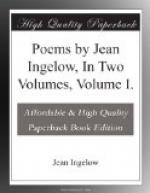He spoke and said, “My lot contented: me;
I am right glad for this her worthy fame;
That which was good and great I fain would see
Drawn with a halo round what rests—its
name.”
This while the Poet said, behold there came
A workman with his tools anear the tree,
And when he read the words he paused awhile
And pondered on them with a wondering smile.
And then he said, “I pray you, Sir, what mean
The golden letters of this monument?”
In wonder quoth the Poet, “Hast thou been
A dweller near at hand, and their intent
Hast neither heard by voice of fame, nor seen
The marble earlier?” “Ay,”
said he, and leant
Upon his spade to hear the tale, then sigh,
And say it was a marvel, and pass by.
Then said the Poet, “This is strange to me.”
But as he mused, with trouble in his mind,
A band of maids approached him leisurely,
Like vessels sailing with a favoring wind;
And of their rosy lips requested he,
As one that for a doubt would solving
find,
The tale, if tale there were, of that white stone,
And those fair letters—“While she
lived she shone.”
Then like a fleet that floats becalmed they stay.
“O, Sir,” saith one, “this
monument is old;
But we have heard our virtuous mothers say
That by their mothers thus the tale was
told:
A Poet made it; journeying then away,
He left us; and though some the meaning
hold
For other than the ancient one, yet we
Receive this legend for a certainty:—
“There was a lily once, most purely white,
Beneath the shadow of these boughs it
grew;
Its starry blossom it unclosed by night,
And a young Poet loved its shape and hue.
He watched it nightly, ’twas so fair a sight,
Until a stormy wind arose and blew,
And when he came once more his flower to greet
Its fallen petals drifted to his feet.
“And for his beautiful white lily’s sake,
That she might be remembered where her
scent
Had been right sweet, he said that he would make
In her dear memory a monument:
For she was purer than a driven flake
Of snow, and in her grace most excellent;
The loveliest life that death did ever mar,
As beautiful to gaze on as a star.”
“I thank you, maid,” the Poet answered
her.
“And I am glad that I have heard
your tale.”
With that they passed; and as an inlander,
Having heard breakers raging in a gale,
And falling down in thunder, will aver
That still, when far away in grassy vale,
He seems to hear those seething waters bound,
So in his ears the maiden’s voice did sound.
He leaned his face upon his hand, and thought,
And thought, until a youth came by that
way;
And once again of him the Poet sought
The story of the star. But, well-a-day!
He said, “The meaning with much doubt is fraught,
The sense thereof can no man surely say;
For still tradition sways the common ear,
That of a truth a star DID DISAPPEAR.




